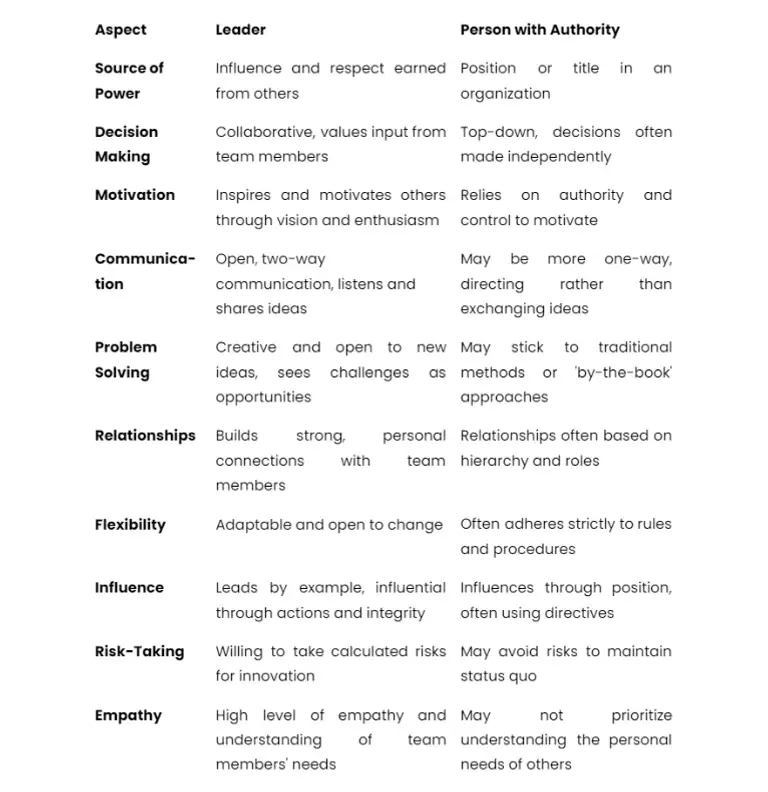Today, we're going to look at how being a leader is different from just having authority.
Often, we associate authority with a job title – it's something granted to you when you reach a certain position in a company or organization. It comes with a set of expectations.
But what about leadership? Leadership is a whole different game. It's not just a title - it's earned through your actions and the way you influence those around you. A true leader inspires and motivates.
Let's see how these two ideas are similar and different, and why they both matter.

Leadership is the ability to guide and inspire a group of people toward achieving a common goal. It involves motivating team members, creating a collaborative environment, and setting a vision for the future. Effective leadership is characterized by strong communication skills, empathy, and the skill to adapt to changing circumstances.
What is authority?

Authority refers to the power or right to give orders, make decisions, and enforce obedience. It's often associated with a specific position or role within an organization, such as a manager or supervisor.
Authority involves the responsibility to oversee and direct the actions of others and to make sure that rules and policies are followed.
Authority vs leadership
The key difference between authority and leadership lies in how influence and direction are exercised:
Authority is about having the power and the right to make decisions, give orders, and expect compliance. It's often tied to a specific position or role within an organization.
For example, a manager has the authority to assign tasks to their team members. Authority is more about formal power and control, where obedience is expected due to the position held by the individual.
Leadership, on the other hand, is about influencing and inspiring people, often beyond the boundaries of formal authority. A leader motivates, guides, and supports others to achieve a common goal.
Leadership isn’t just about holding a position of power - it's about how one behaves and interacts with others. A leader can exist at any level in an organization, regardless of their formal authority.
They earn respect and followership through their actions, vision, and ability to connect with people.
In summary, authority is based on a designated position and the power it grants, while leadership is about the ability to positively influence and inspire others, irrespective of formal authority.
Breaking down the key differences: authority and leadership
Let's break down the differences and similarities between authority and leadership based on the following key aspects:
Source of influence
- Authority - the source of influence in authority comes from a formal position or title within an organization. It's granted and recognized through the organizational structure.
- Leadership - leadership’s influence is more personal and often informal. It stems from the leader's character, behavior, skills, and ability to inspire others.
Nature of influence
- Authority - authority involves a top-down approach, where directives and decisions flow from the higher levels to the lower levels of an organization.
- Leadership - leadership's influence is often collaborative and inspirational. Leaders influence by encouraging participation, sharing a vision, and motivating through respect and trust.
Focus on position vs. people
- Authority - authority focuses more on position, role, and the responsibilities that come with it. It's about maintaining order and staying compliant.
- Leadership - leadership is people-oriented. It focuses on developing relationships, understanding individual team members, and working towards collective success.
Response to change
- Authority - authority can sometimes be rigid, with a focus on maintaining existing structures and processes.
- Leadership - leadership is generally more adaptable to change. Leaders often drive change as they embrace new ideas and encourage innovation.
Duration
- Authority - the duration of authority is typically tied to a specific role or tenure in a position.
- Leadership - leadership can endure beyond a formal role or position. The impact of a leader can last through the legacy they leave behind.
Followership
- Authority - followership under authority is often obligatory, based on hierarchy and job requirements.
- Leadership - followership in leadership is voluntary. People choose to follow because of admiration, belief in the leader's vision, or the respect they have for the leader.
Communication style
- Authority - communication in authoritative settings tends to be more directive, with clear instructions and expectations.
- Leadership - leadership usually involves more open, two-way communication. Leaders often encourage feedback, value input from team members, as well as engage in more empathetic and motivational dialogue.
The skills of a leader vs the skills of a person with authority
Leadership skills differ slightly from those that people holding authority have.

This table aims to clarify that while leaders and authoritative figures may both hold positions of responsibility, their approaches, methods, and influence can be quite different.
Leaders often rely on personal qualities and interpersonal skills, whereas authoritative figures might depend more on their formal power and position.
What do leadership and authority people have in common?
Becoming a leader or a person with authority is no easy job.
Do you want to know how to get there? While many elements make up the puzzle, today we want to focus on one: time management.
Great leaders and high-authority people need to master time management.
How to do it? Well, with Unrubble - it's pretty simple.

Unrubble offers time management solutions that can be pivotal for anyone aspiring to become a leader or person of authority in their field.
The platform's features like time tracking and scheduling are designed to boost productivity and efficiency.
With time tracking, individuals can monitor work hours precisely.
The scheduling feature allows for effortless planning and coordination, streamlining processes, and improving team collaboration.
These tools not only aid in personal time management but also in effectively managing a team - a critical aspect of leadership. Thanks to Unrubble, your team can focus more on strategic tasks and less on administrative work. As such, paving the way for leadership development becomes easy.
Using Unrubble can help you step up into a leadership or authority role.
So try it today.

What else do we offer?
Conclusion
Whether you’re steering the ship or cheering from the deck, the key is to know when to take charge and when to inspire.
Until next time - keep leading, keep learning, and maybe, just occasionally, break a rule or two – in the name of good leadership, of course!
And don't forget to give Unrubble a try. We promise to take your role to the next level.








